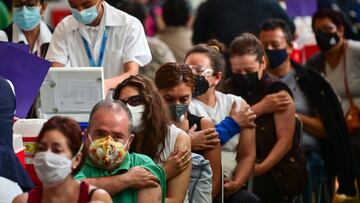Coronavirus US: until when is the vaccine effective?
With the number of people in the US vaccinated against covid-19 growing, researchers are working hard to figure out just how long that immunity will last.

Vaccines to protect against covid-19 became available to all those in the US ages twelve and above in May. Since then, variants have emerged in the US and around the world leading to one critical question: how long is the vaccine effective?
There are a variety of ways this question can be answered and may depend on the definition of effective. When Pfizer and Modern released the results of their clinical trials, it showed that their mRNA vaccines were over 90% effective when individuals received both doses. The high rate of efficacy surprised and wowed many as most vaccines tend to be around 70% effective in protecting against a certain disease.
The vaccine developed to fight the seasonal flu can range from having an efficacy rate in the low thirties to the high seventies, depending on how well doctors did in determining which strains of the flu would circulate. Other vaccines, including those for measles and polio, have efficacy rates in the ninety percent range. However, these high rates, in part, relate to how effective widespread vaccination campaigns have been in limiting the spread of these incredibly contagious diseases. The vaccines for these diseases which plagued humanity for centuries are effective, and with fewer chances to infect, they do a good job at preventing outbreaks.
Although data showing increases in confirmed cases of measles in the last few years has been released, the cases are often concentrated in areas with low vaccination rates. This same phenomenon can be seen with covid-19. Areas with high vaccination levels are seeing less transmission, fewer hospitalizations, and deaths down to their lowest point since the pandemic began. Meanwhile, states with lower vaccination rates are seeing increases in cases, especially as more transmissible variants begging to appear in the US.
Read more about the covid-19
What do we know about how long protection lasts for a covid-19 vaccine?
The Centers for Disease Control and Prevention (CDC) published a list of questions researchers are still investigating, one of which is how long covid-19 vaccines protect people. Currently, scientists are able to test those who have received the vaccine to evaluate their antibody levels. But, with limited data on what levels are needed to prevent infection, they cannot yet interpret the data.
A group of experts at Oxford Earlier this year, NPR reported that some scientists at Oxford are looking at this exact question, “what level of antibodies is enough to provide protection against future infection.”
Chris Houchens, director for chemical, biological, radiological and nuclear countermeasures at the U.S. government's Biomedical Advanced Research and Development Authority believes that antibody tests are the key to understanding how vaccines prevent infection. Speaking with NPR Houchens said that the antibody levels can be used as a “cutoff” meaning that “if anyone who has that level of antibodies, either induced by natural infection or by vaccination, is protected."
In April, Pfizer and BioNTech published a press release with Pfizer Chairman and CEO Albert Bourla, saying that “The high vaccine efficacy observed through up to six months following a second dose and against the variant prevalent in South Africa provides further confidence in our vaccine’s overall effectiveness.” A similar study conducted on Moderna also found that those who had received both doses had a level of antibodies high enough to prevent infection after six months.






